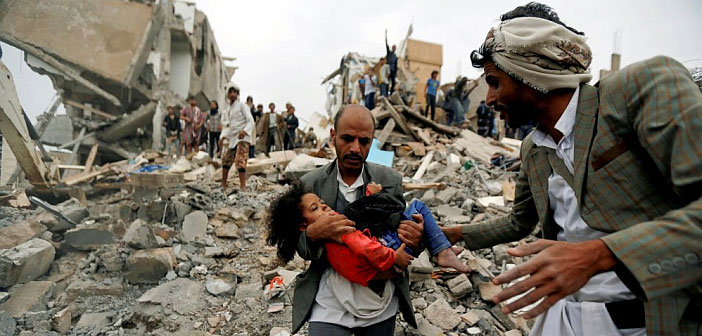Source: Ceasefire
If the bombing of a school bus full of Yemeni children isn’t enough to stop UK arms sales to Saudi Arabia, then what more would it take? Asks Andrew Smith of Campaign Against Arms Trade.
“Scores killed, even more injured, most under the age of ten.” That is what Johannes Bruwer, head of the Yemen International Committee for the Red Cross tweeted to describe the most recent atrocity that Saudi Arabian-led forces have inflicted on Yemen.
Saudi forces had blown up a school bus that was on its way back from a picnic. At least 29 children were killed, with many more injured. The pictures that were broadcast were so shocking that they finally caused the global media to finally pay attention to what many refer to as the “forgotten war.”
It is the latest in a long series of appalling massacres that have been caused by the bombardment.
In March 2015, only two weeks after the war began, Saudi forces bombed a refugee camp, killing 40 people. One year later, in March 2016, the same forces bombed a market place in the capital city of Sana’a, killing 97 people. October 2016 saw the bombing of a funeral, killing 140 people. In November 2017, 25 people were killed in another market. This April 20 people were killed at a wedding, including the bride.
The bombing campaign has destroyed vital infrastructure and created one of the worst humanitarian crises in the world. Over one million people have been infected by cholera because of the breakdown of health services and water systems. Reports from UNICEF have shown that a child is dying every 10 minutes from preventable causes.
The crisis has exacerbated the conflict. As one Yemeni citizen explained to Deutsche Welle: “The humanitarian situation is bad. Life is difficult for most people, and poverty is forcing a lot of people into becoming fighters.”
It is not just Saudi bombers that have shown a complete disregard for Yemen, it is also those that have armed and supported them. This includes Downing Street, with the UK government having licensed almost £5 billion worth of fighter jets and bombs since the intervention began.
Number 10’s attitude was summed up last year by the then Defence Minister, Michael Fallon, when he urged MPs to stop challenging the Saudi regime in case it impacted on arms sales. “Criticism of Saudi Arabia in this parliament is not helpful” he said, while stressing the need to sell a new batch of Eurofighter aircraft.
Over the last few days they have seen how badly the Saudi dictatorship takes any rebukes or criticism. Last week the Canadian Foreign Ministry published a series of Tweets that rightly condemned the arrest of women’s rights activists in Saudi Arabia.
Within days, the Saudi government had ordered the Canadian ambassador to leave Riyadh. It also recalled its ambassador from Canada and froze all trade with the country. The response has been all the more remarkable when considering that, despite its liberal rhetoric, the Canadian government is a major supplier of arms to Saudi forces.
What the response shows is how afraid of criticism Saudi Royalty is, and how scared it is when one of its backers steps out of line. In contrast, the official UK response to the extraordinary situation has been one of pathetic neutrality. “Canada and Saudi Arabia are both close partners of the UK, and we urge restraint during the current situation.”
The pitiful response has been totally consistent with the red-carpet treatment that was offered to the Saudi Crown Prince, Mohammad Bin Salman, when he visited London in February. All stops were pulled out as he was given the major propaganda victory of lunch with the Queen and meetings in Downing Street.
It is also consistent with the shameful silence and complicity Downing Street has offered regarding the war in Yemen. At the time of writing, neither Downing Street not the Foreign and Commonwealth office has released any official statement regarding the school bus bombing.
By the UK government’s own admission it is aware of over 300 possible violations of international humanitarian law that have been carried out by Saudi forces in Yemen. If these 300 ‘incidents’ are not enough to stop the arms sales, then what more would it take? If the bombing of a school bus full of children isn’t enough to stop the arms sales, then what more would it take?
The history books will show that this has been a man-made crisis. They will remember who created it, as well as those that allowed it to happen.
Even at this late stage, after three years of war, Theresa May, Jeremy Hunt and their colleagues must finally do the right thing. If not now, then how much worse would it need to get? It’s time to end the arms sales.

